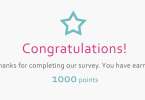Today’s online survey tools provide a wealth of remarkable opportunities for savvy marketers. Well designed, useful surveys help businesses obtain valuable customer service information, yet in their quest to get the most reliable, accurate results, they still create questionnaires that turn many of their survey participants off. The result is lower completion rates and low satisfaction from participants.
Learning from The Mistakes of Others

Many studies have demonstrated the profound importance of positive “word-of-mouth” advertising. One study confirmed the ongoing vitality of this phenomenon: significantly, 92%1 of shoppers esteem the opinions of their loved ones and close friends above any form of advertising claims when they evaluate goods and services in the marketplace. In order to connect and engage with these consumers, marketers must also impress their family members and peers favorably.
Several complaints about surveys fall into specific, readily identifiable categories. By carefully avoiding these common mistakes, companies can draft consumer questionnaires which participants will actually enjoy completing. This benefit can ultimately translate into positive word-of-mouth advertising and increased company goodwill (and potential sales revenues).
Bad Survey Design: Avoid These Mistakes:
What aspects of surveys do survey-takers dislike? These items rank high among participant complaints:
1. Deception about the purpose of the survey

2. Time-consuming, repetitive questions
Poorly written surveys which ask the same or similar question repetitively also upset large numbers of participants. Survey takers frequently complain about these types of questionnaires, which appear to disregard or discount the importance of their time. Grid questions (as pictured above) are a particularly bad offender.
One research company3 recently reported nearly 60% of people responding to its survey about opinion polls complained about the length of time required to complete surveys. Nearly a third also felt survey questions appeared unduly repetitive.
These factors have caused some participants to choose surveys more selectively,4 and impose their own rules, such as refusing to complete surveys which take over 20 minutes to complete.
3. Discounting participant answers
When survey questions solicit responses, participants object to follow-up questions which completely disregard their answers. For instance, one survey-taker felt mistreated by a question which requested a job title immediately after the participant had listed a retired status.5

4. Disqualifying Questions
Survey writers frequently employ screening questions to help target surveys towards specific groups. Yet disqualified would-be responders may object to the rejection of their input. Companies sometimes inadvertently generate ill-will through the use of this strategy.6
» Discover which panels don't ask disqualification questions
How Companies Can Prepare More Effective Surveys
What steps can companies take to improve their surveys?
- Keep the length as brief as possible. By respecting the time of participants, they’ll generate greater goodwill.
- Supply accurate information about the purpose of the survey directly from the outset.
- Edit questions carefully to remove confusing or repetitive inquiries.
- Ensure follow-up questions won’t ignore possible responses to previous questions.
- If the plan is to disqualify or “screen out” some participants, reveal this fact at the beginning of the survey.
Adhering to these guidelines will help companies create a positive experience for survey respondents. Ultimately, this process will help enhance a company’s reputation, versus harming it through a poorly designed survey.
» Find out which survey sites survey takers like best
Sources:
1. https://www.forbes.com/sites/kimberlywhitler/2014/07/17/why-word-of-mouth-marketing-is-the-most-important-social-media/#4625326c54a8
2. https://www.nytimes.com/2014/06/06/upshot/why-people-hate-taking-surveys.html?mcubz=0
3. http://web.peanutlabs.com/why-do-people-hate-marketing-research-surveys/
4. https://forum.surveypolice.com/index.php?/topic/9945-recurring-surveys-you-run-away-from/
5. https://forum.surveypolice.com/index.php?/topic/9998-phrases-in-survey-questions-that-bug-you/
6. http://web.peanutlabs.com/why-do-people-hate-marketing-research-surveys/








